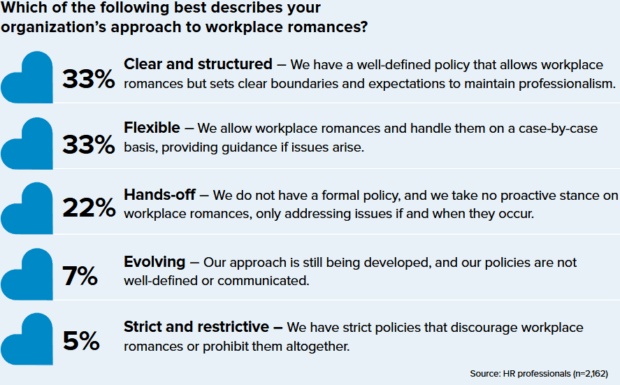The media attention and fallout surrounding two high-level employees of AI tech firm Astronomer, seen in an embrace during a Coldplay concert, should put employers on notice to re-evaluate rules relating to workplace romance, according to an article published last week in the National Law Review.
The article, “Caught in the Act: Practical and Legal Considerations When Executives’ Office Love Affair Exposed,” by William E. Grob and Zachery V. Zagger of the law firm of Ogletree, Deakins, Nash, Smoak, and Stewart, P.C., highlighted the risks associated with such dalliances, including employment discrimination claims and/or harassment claims.
The attorneys suggest that employers implement and communicate clear policies relating to such relationships, while emphasizing the importance of having a clear succession plan in place–an important factor when considering the two Astronomer employees at the time were C-Suite executives.
The guidance comes at a crucial time, as more than half (52 percent) of U.S. workers surveyed have been involved in a workplace romance, according to the Society for Human Resource Management (SHRM).
Those surveyed late last year included 1,071 U.S. workers and 2,283 HR professionals to evaluate the frequency of workplace romances, what instigates them, and how employers address the situation.
Love was an important or very important factor in the development of a workplace relationship, with some (21 percent) indicating that they engaged in public displays of affection even though they knew it was inappropriate.
Interestingly, 63 percent of managers said that workplace romances have had a positive effect on team dynamics.
Approaches vary in terms of how workplace romances are handled, according to the survey.
Those organizations employing clear and structured rules matched those with flexible rules.

Rules regarding office romances are typically outlined in an employee handbook, according to 64 percent of respondents.
Other ways of communicating the rules included during the onboarding process (22 percent), during training sessions (15 percent), through internal communications (11 percent), and via company meetings (4 percent).
Favoritism and preferential treatment are a concern to 68 percent of human resource professionals.
Because of the potential for workplace romance to develop, SHRM recommends that employers consider “addressing the potential for both positive and negative outcomes, including ethical challenges and blurred boundaries.”
The findings indicate the importance of establishing effective policies.
It is recommended that organizations address concerns about favoritism and unfair treatment, SHRM added.
Anti-harassment training should also be considered, according to Grob and Zagger.
Link to original article: https://natlawreview.com/article/caught-act-practical-and-legal-considerations-when-executives-office-love-affair
Source link
